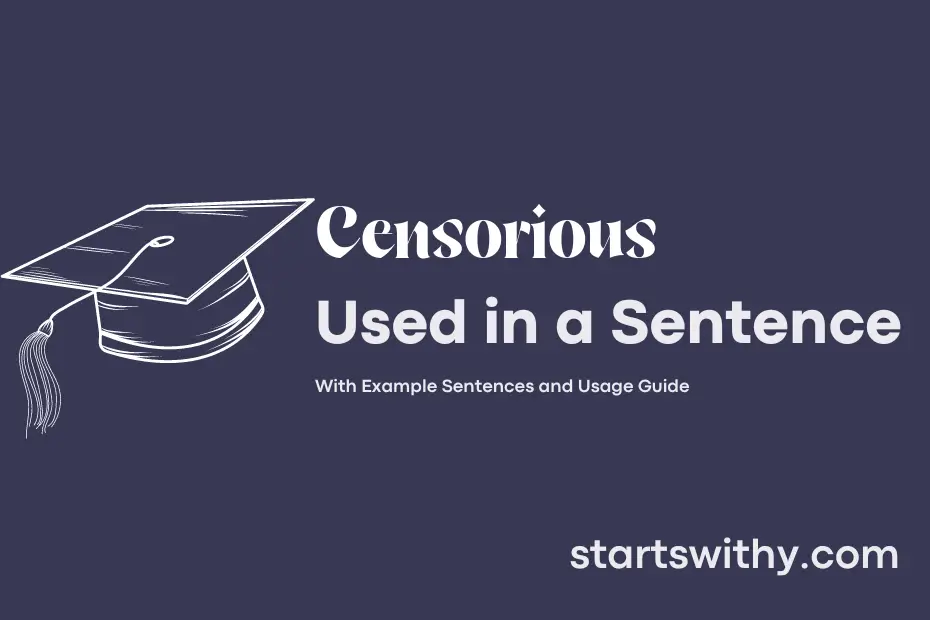Have you ever encountered a censorious individual, someone who is overly critical or fault-finding? Being censorious means being inclined to judge harshly or condemn rather than offer constructive criticism. It involves a tendency to point out flaws or hold strong opinions about what is deemed right or wrong.
In conversation or writing, a censorious tone can alienate others and stifle open communication. It’s important to be mindful of how our words come across and strive for a balanced, respectful approach when expressing disapproval or making critiques.
7 Examples Of Censorious Used In a Sentence For Kids
- Censorious means being too critical of others.
- We should try not to be censorious towards our friends.
- It’s important to be kind and not censorious.
- We should always think before making a censorious remark.
- Being censorious can hurt people’s feelings.
- Let’s remember to be gentle and not censorious.
- We should choose our words carefully to avoid being censorious.
14 Sentences with Censorious Examples
- Censorious remarks from the professor left the students feeling discouraged after their presentations.
- Students avoided speaking up in class discussions, fearing censorious reactions from their peers.
- The college library’s strict rules made it a censorious environment for students trying to study.
- Aspiring writers often feel apprehensive about sharing their work in censorious creative writing classes.
- The debate team faced censorious criticism from judges during the competition.
- Harsh and censorious feedback on their research papers made students hesitant to approach their professors for help.
- The student council meeting turned into a censorious session, with members pointing fingers at each other’s mistakes.
- The college newspaper editor was known for her censorious attitude towards articles that she deemed controversial.
- Students were wary of expressing their opinions openly during censorious political science discussions.
- The campus theater group received censorious reviews for their latest production.
- The competitive nature of the business school fostered a censorious atmosphere among students.
- The guest speaker faced censorious questions from the audience during the Q&A session.
- The college professor’s censorious tone during lectures made it difficult for students to ask questions.
- Group projects often led to censorious tension among teammates who disagreed on the approach to take.
How To Use Censorious in Sentences?
Censorious means to be excessively critical or disapproving, often in a judgmental or harsh manner. When using this word in a sentence, it is important to place it in the appropriate context to convey its intended meaning.
Example sentence: “She received censorious glances from her colleagues after making a mistake during the presentation.”
In this sentence, the word censorious is used to describe the critical and disapproving looks that the person received from their colleagues. It conveys a sense of judgment and disapproval towards the individual’s actions.
When incorporating censorious into a sentence, consider the tone and atmosphere you want to create. This word is often used to highlight a sense of harsh judgment or criticism, so make sure it fits the overall message you are trying to convey.
Overall, practice using censorious in various sentences to become more comfortable with its usage and to better understand its nuances. Experiment with different contexts to see how the word can be applied effectively in communication.
Conclusion
In conclusion, “censorious” is an adjective used to describe someone who is harshly critical or quick to find fault. This word is often used to characterize individuals who are judgmental or disapproving in their comments or behavior. For example, sentences with “censorious” could include, “The teacher’s censorious remarks made the students feel self-conscious about their work,” or “Her censorious attitude towards others often alienated her from those around her.”
Understanding the meaning of “censorious” is important as it highlights the impact of criticism and negativity on individuals. By recognizing censorious behavior, we can strive to promote a more positive and supportive environment for ourselves and others. It’s crucial to be mindful of our language and ensure that our feedback is constructive rather than censorious.



